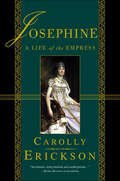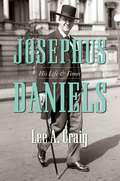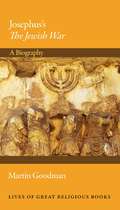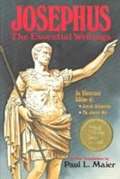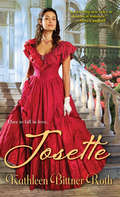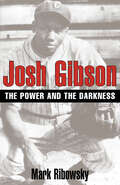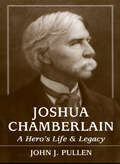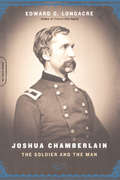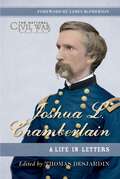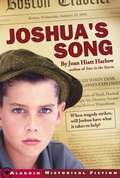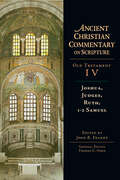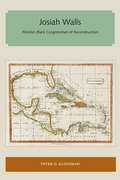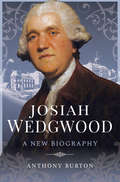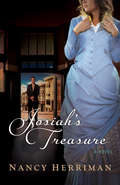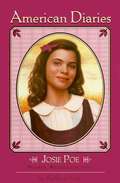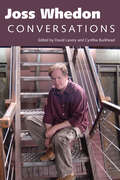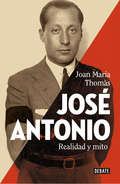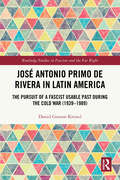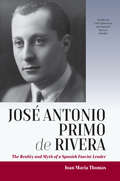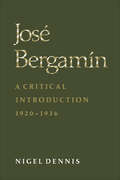- Table View
- List View
Josephine: A Life of the Empress
by Carolly EricksonJosephine Tascher de la Pagerie, born a Creole on the island of Martinique in the French West Indies, became one of the best known and most envied women who ever lived. Sent to France to make an advantageous marriage to a young aristocrat, her naivete and lack of education left her ill prepared to deal with the sophisticated - if decadent - world of pre-Revolutionary Paris. Treated cruelly by her shallow young husband, her life had become a nightmare during the Terror, in which she was imprisoned and almost lost her life. It was during this period that she honed the skills of manipulation and seduction that would lead her from the dungeons of the terror into the beds of the post-Revolutionary powerbrokers, including the Corsican corporal who would conquer Europe.As the wife of Napoleon Bonaparte, conqueror of Europe and the wonder of his age, Josephine was assumed to be a worthy consort for her astounding husband, a woman as beautiful, wise and altogether remarkable as he was charismatic, brilliant, and invincible in battle. When in 1804 she knelt before Napoleon in Notre Dame and he placed the imperial crown on her head, making her Empress of France, her extraordinary destiny seemed to be fulfilled. The unknown woman from Martinique became the highest ranking woman in the land, as far above the average Frenchwoman as Napoleon himself was above the humblest soldier in his armies.Yet the truth behind the glorious symbolism in Notre Dame was much darker. For the eight-year marriage between Josephine and Napoleon had long been corroded by infidelity and abuse, and for years Josephine had dreaded that her husband would divorce her. Far from the love match previous biographers have described, Erickson's Napoleon and Josephine were the ultimate pragmatists, drawn together by political necessity while their emotions were engaged elsewhere.Carolly Erickson, the critically acclaimed biographer of the Tudor monarchs, as well as of Marie Antoinette and Queen Victoria, using her trademark ability to penetrate and explain the psychological make-up of her subjects, paints a fascinating portrait of an immensely complex and ultimately tragic woman.
Josephus Daniels
by Lee A. CraigAs a longtime leader of the Democratic Party and key member of Woodrow Wilson's cabinet, Josephus Daniels was one of the most influential progressive politicians in the country, and as secretary of the navy during the First World War, he became one of the most important men in the world. Before that, Daniels revolutionized the newspaper industry in the South, forever changing the relationship between politics and the news media. Lee A. Craig, an expert on economic history, delves into Daniels's extensive archive to inform this nuanced and eminently readable biography, following Daniels's rise to power in North Carolina and chronicling his influence on twentieth-century politics.A man of great contradictions, Daniels--an ardent prohibitionist, free trader, and Free Silverite--made a fortune in private industry yet served as a persistent critic of unregulated capitalism. He championed progressive causes like the graded public school movement and antitrust laws even as he led North Carolina's white supremacy movement. Craig pulls no punches in his definitive biography of this political powerhouse.
Josephus's The Jewish War: A Biography (Lives of Great Religious Books #45)
by Martin GoodmanAn essential introduction to Josephus’s momentous war narrativeThe Jewish War is Josephus's superbly evocative account of the Jewish revolt against Rome, which was crushed in 70 CE with the siege of Jerusalem and the destruction of the Temple. Martin Goodman describes the life of this book, from its composition in Greek for a Roman readership to the myriad ways it touched the lives of Jews and Christians over the span of two millennia.The scion of a priestly Jewish family, Josephus became a rebel general at the start of the war. Captured by the enemy general Vespasian, Josephus predicted correctly that Vespasian would be the future emperor of Rome and thus witnessed the final stages of the siege of Jerusalem from the safety of the Roman camp and wrote his history of these cataclysmic events from a comfortable exile in Rome. His history enjoyed enormous popularity among Christians, who saw it as a testimony to the world that gave rise to their faith and a record of the suffering of the Jews due to their rejection of Christ. Jews were hardly aware of the book until the Renaissance. In the nineteenth century, Josephus's history became an important source for recovering Jewish history, yet Jewish enthusiasm for his stories of heroism—such as the doomed defense of Masada—has been tempered by suspicion of a writer who betrayed his own people.Goodman provides a concise biography of one of the greatest war narratives ever written, explaining why Josephus's book continues to hold such fascination today.
Josephus: The Essential Writings
by Flavius JosephusAn award-winning translation and condensation of Jewish Antiquities and The Jewish War. Translated and edited by Paul L. Maier.
Josette (Bayou Bad Boys)
by Kathleen Bittner Roth"An exciting new voice in historical romance." --Anna Campbell, award?winning author of What a Duke Dares"Monsieur Andrews, welcome to my home."At the smoky, velvet sound, Cameron swung around. Every function in his body--heart, breath, blood ceased to function. She was lovely. More than lovely. Tendrils of raven hair framed a face so exquisite, it disarmed him. Her mouth, a soft, dewy pink, parted. And those eyes, as dark as Creole coffee, intelligent and assessing, roamed over him and then back to take hold of his. He needed to step closer, to stroke her skin. To possess her. But would his wealth and worldly experience be a match for the free-spirited Cajun-born widow? Across the oceans, between worlds old and new--two lost souls find themselves at a crossroads.
Josh Gibson: The Power and the Darkness
by Mark Ribowsky<p>It is said that Josh Gibson is the only man ever to have hit a fair ball out of Yankee Stadium. Some claim he hit as many as seventy-five home runs in a season. All agreed he was a frightening hitter to face. What Satchel Paige was to pitching in the Negro leagues, Gibson was to hitting: their greatest star, biggest gate attraction, and most important symbol. <p>Though Gibson is best remembered as "the black Babe Ruth," Ruth became a beloved symbol of the national pastime, while Gibson lived a life veiled in the darkness that came both from the shadow world of the Negro leagues and from within his own tortured soul. <p>Mark Ribowsky, the widely acclaimed biographer of Satchel Paige, pulls no punches in his portrait of this magnificent, troubled athlete. This is the most complete, thorough, and authoritative account of the life of black ball's greatest hitter, and one of its most important stars.</p>
Josh Gibson: The Power and the Darkness
by Mark RibowskyIt is said that Josh Gibson is the only man ever to have hit a fair ball out of Yankee Stadium. Some claim he hit as many as seventy-five home runs in a season. All agreed he was a frightening hitter to face. What Satchel Paige was to pitching in the Negro leagues, Gibson was to hitting: their greatest star, biggest gate attraction, and most important symbol. Though Gibson is best remembered as "the black Babe Ruth," Ruth became a beloved symbol of the national pastime, while Gibson lived a life veiled in the darkness that came both from the shadow world of the Negro leagues and from within his own tortured soul. Mark Ribowsky, the widely acclaimed biographer of Satchel Paige, pulls no punches in his portrait of this magnificent, troubled athlete. This is the most complete, thorough, and authoritative account of the life of black ball's greatest hitter, and one of its most important stars.
Joshua Chamberlain: A Hero's Life and Legacy
by John J PullenFrom a National Book Award finalist, an &“entertaining and inspiring&” biography of the heroic Gettysburg commander, college president, and governor of Maine (Senator George J. Mitchell). This is a vivid account of the life of Joshua Chamberlain, whose is best known for leading a successful bayonet charge against a Confederate assault that was memorialized in the film Gettysburg—and earned Chamberlain the Medal of Honor. But his life was long and his military, political, and academic careers were filled with numerous notable accomplishments as well, among them the governorship of Maine and presidency of Bowdoin College, before his Civil War wounds finally caught up with him in 1914. This account, with illustrations included, tells his absorbing, wide-ranging story, explores his continuing mystique, and paints a vivid picture of late nineteenth-century New England. &“A worthy tribute to Chamberlain&’s lasting legacy.&” —Civil War Book Review &“Joshua Chamberlain was much more than a war hero, and Pullen&’s thoughtful book fills out the picture of his remarkable life.&” —Senator George J. Mitchell &“Reveal[s] a complicated character, without diminishing the almost mythic status he has assumed.&” —The Washington Times
Joshua Chamberlain: The Soldier and the Man
by Edward G. LongacreJoshua Chamberlain became the "hero of Gettysburg" when he and his regiment, the 20th Maine, bravely held Little Round Top against a determined Rebel assault. Chamberlain's reputation as a celebrated soldier continued to grow in the decades that followed the war. Yet, Joshua Chamberlain, the soldier, is only part of the story of his remarkable life. Edward G. Longacre's biography of Joshua Chamberlain is the first biography to examine the entire life and career of this complicated man. The author skillfully investigates and analyzes all aspects of his life and character-before and after the Civil War. And Longacre re-examines Chamberlain's extraordinary military career as a Union officer, drawing on independent-and occasionally contradictory-eyewitness accounts of his battlefield actions. Longacre's meticulous research also suggests that Chamberlain's own account of his military actions can no longer be taken entirely at face value.
Joshua L. Chamberlain
by Thomas DesjardinJoshua Lawrence Chamberlain has been a central character in two feature films (Gettysburg and Gods & Generals), a Pulitzer Prize-winning novel (The Killer Angels), and an inspiration for Ken Burns's production of the highly acclaimed PBS series The Civil War. Chamberlain won national fame at the Battle of Gettysburg for his key role in fending off the Confederates at Little Round Top on day two of the battle.This new volume brings to public light 300 never-before-seen letters from Chamberlain's personal correspondence, which comprises letters sent by or to Chamberlain from his college years in 1852 to his death in 1914. The first 100 letters shed light on Chamberlain's formative years and his courtship with Fannie Adams, which has been the source of much speculation by scholars. The final 200 letters reveal insights into Chamberlain the Union commander and the aftermath of the war. Chamberlain's image can be found on everything from historical art to sculpture, from t-shirts to clocks, from bobble-head dolls to snow globes. Despite all this attention, there is still a lot about Chamberlain that most people do not know. His life is a remarkable story of perseverance, tragedy, and triumph. From an insecure young man with a considerable stuttering problem who grew up in a small town in eastern Maine, Joshua Chamberlain rose to become a major general, recipient of the Medal of Honor, Governor of Maine, and President of Bowdoin College. His writings are among the most oft-quoted of all Civil War memoirs, and he has become a legendary, even mythical historical figure. Historian and acclaimed author, Thomas Desjardin, puts Chamberlain's words in contemporary and historical context and uses this extraordinary collection of letters to reveal--for the first time--the full and remarkable life of Joshua Chamberlain. Readers will find this unique portrait of Chamberlain to be entertaining, moving, and inspiring.
Joshua's Song
by Joan Hiatt HarlowBoston, 1919. It's been a terrible year for thirteen-year-old Joshua Harper. The influenza pandemic that's sweeping the world has claimed his father's life; his voice has changed, so he can't sing in the Boston Boys' Choir anymore; and now money is tight, so he must quit school to get a job. It's not fair! Joshua begins working as a newspaper boy, hawking papers on the street, but he soon finds himself competing with Charlestown Charlie, a tough, streetwise boy who does not make things easier for Joshua. It seems that fitting in is not as easy as it once was. Then disaster strikes the city of Boston. Joshua must do what he can to help, and in doing so he finds the place--and the voice--that he thought he'd lost. This remarkable novel is fast-paced, suspenseful, and based on true incidents in Boston history.
Joshua, Judges, Ruth, 1-2 Samuel (Ancient Christian Commentary on Scripture #4)
by John R. FrankeQuestions on the HeptateuchQuestions on the OctateuchThirty Questions on 1 Samuel
Joshua’s Song
by Joan Hiatt HarlowNeeding to earn money after his father's death during the influenza epidemic of 1918, Joshua works as a newspaper boy in Boston, one day finding himself in the vicinity of an explosion that sends tons of molasses coursing through the streets.
Josiah Walls: Florida's Black Congressman of Reconstruction (Florida and the Caribbean Open Books Series)
by Peter D. KlingmanThe books in the Florida and the Caribbean Open Books Series demonstrate the University Press of Florida’s long history of publishing Latin American and Caribbean studies titles that connect in and through Florida, highlighting the connections between the Sunshine State and its neighboring islands. Books in this series show how early explorers found and settled Florida and the Caribbean. They tell the tales of early pioneers, both foreign and domestic. They examine topics critical to the area such as travel, migration, economic opportunity, and tourism. They look at the growth of Florida and the Caribbean and the attendant pressures on the environment, culture, urban development, and the movement of peoples, both forced and voluntary.The Florida and the Caribbean Open Books Series gathers the rich data available in these architectural, archaeological, cultural, and historical works, as well as the travelogues and naturalists’ sketches of the area prior to the twentieth century, making it accessible for scholars and the general public alike.The Florida and the Caribbean Open Books Series is made possible through a grant from the National Endowment for the Humanities and the Andrew W. Mellon Foundation, under the Humanities Open Books program.
Josiah Wedgwood: A New Biography
by Anthony BurtonThe story of the innovative genius who became pottery maker to royalty—and to the world: &“You don't have to know a glaze from a slip to enjoy this.&” —Kirkus Reviews Born in Staffordshire, England, to a family of traditional potters in 1730, Josiah Wedgwood would grow up to revolutionize the industry, founding the company still world-renowned in the twenty-first century. When he started work, the local ware was either fairly rustic, or made to look a little more sophisticated by the addition of heavy glazes. He worked to produce a lighter colored body and to use designs made to appeal to aristocratic tastes, convinced that where they led the rapidly growing middle class would follow. The result was cream ware which, when a whole service was ordered by the royal family, was soon christened queens ware. But Wedgwood was a distinctive character for more reasons than his artistry. As a businessman, he adopted an early form of mass production, and is believed to be the inventor of many modern marketing techniques such as money-back guarantees and illustrated catalogs. He was also a passionate early abolitionist who used his company to promote the anti-slavery cause, and he pursued the study of chemistry in order to understand the science behind the potter&’s art, eventually inventing a kiln thermometer. This fascinating biography brings to life a remarkable eighteenth-century figure.
Josiah Wedgwood: A New Biography
by Anthony BurtonThe story of the innovative genius who became pottery maker to royalty—and to the world: &“You don't have to know a glaze from a slip to enjoy this.&” —Kirkus Reviews Born in Staffordshire, England, to a family of traditional potters in 1730, Josiah Wedgwood would grow up to revolutionize the industry, founding the company still world-renowned in the twenty-first century. When he started work, the local ware was either fairly rustic, or made to look a little more sophisticated by the addition of heavy glazes. He worked to produce a lighter colored body and to use designs made to appeal to aristocratic tastes, convinced that where they led the rapidly growing middle class would follow. The result was cream ware which, when a whole service was ordered by the royal family, was soon christened queens ware. But Wedgwood was a distinctive character for more reasons than his artistry. As a businessman, he adopted an early form of mass production, and is believed to be the inventor of many modern marketing techniques such as money-back guarantees and illustrated catalogs. He was also a passionate early abolitionist who used his company to promote the anti-slavery cause, and he pursued the study of chemistry in order to understand the science behind the potter&’s art, eventually inventing a kiln thermometer. This fascinating biography brings to life a remarkable eighteenth-century figure.
Josiah's Treasure: A Novel
by Nancy HerrimanIn 1882 Sarah Whittier dreams of opening an art studio run by immigrant women. She plans to use the house left to her by family friend Josiah Cady as collateral for her studio. But will all be lost when the inheritance is challenged by an angry man claiming to be Josiah's son and legal heir? Rumor of gold nuggets hidden in the house place Sarah's life in danger. Her future uncertain and her safety threatened, Sarah has nowhere to turn. That is, unless she can soften a vengeful man's heart - and they both learn that love is finer than any gold.
Josie Poe: Palouse, Washington, 1943 (American Diaries)
by Kathleen DueyPalouse, Washington, 1943. Please god, let us win this lousy war soon. World War II has changed life for everyone in the little farming town of Palouse, Washington. Josie Poe spends long nights afraid that bombs could begin to fall at any moment. Her days are consumed with trying to find ways to help the war effort. Like most American kids, she is growing a Victory Garden, wearing clothes that are two or three years old, and saving up money to buy war stamps and bonds. But the harder she works to help the war effort, the more Josie Poe is ashamed of her older brother. Tom hasn't enlisted in the armed services, even though all his good friends have. Everyone in town has a loved one fighting in Europe or the Pacific -- none of the other young men were cowardly about their duty. When a robbery seems to involve Tom, Josie has to find out the truth about her brother. What she learns -- and what she does -- will change her relationship with him forever.
Joss Whedon: Conversations (Television Conversations Series)
by David Lavery Cynthia BurkheadNo recent television creator has generated more critical, scholarly, and popular discussion or acquired as devoted a cult following as Joss Whedon (b. 1964). No fewer than thirty books concerned with his work have now been published, and ten international conferences on his work have convened in the U.K., the United States, Australia, and Turkey. Fitting then that this first volume in University Press of Mississippi's Television Conversations Series is devoted to the writer, director, and showrunner who has delivered Buffy the Vampire Slayer (The WB, 1997–2001; UPN, 2001–3), Angel (The WB, 1999–2004), Firefly (2002), Dr. Horrible's Sing-Along Blog (Webcast, 2008), and Dollhouse (FOX, 2009-10). If Whedon has shown himself to be a virtuoso screenwriter/script-doctor, director, comic book author, and librettist, he is as well a masterful conversationalist. As a DVD commentator, for example, the consistently hilarious, reliably insightful, frequently moving Whedon has few rivals. In his many interviews he likewise shines. Whether answering a hundred rapid-fire, mostly silly questions from fans on the Internet, fielding serious inquiries about his craft and career from television colleagues, or assessing his disappointments, Whedon seldom fails to provoke laughter and reflection.
José Antonio
by Joan Maria ThomàsLa biografía más importante que se ha escrito de José Antonio Primo de Rivera. Un libro que revela un nuevo enfoque, por primera vez imparcial pero a la vez controvertido, sobre la figura del fundador de la Falange Española y uno de los personajes más relevantes de la historia y la política españolas. ¿Quién fue José Antonio? Pocas figuras del siglo XX español han sido tan profusamente mitificadas como la de José Antonio Primo de Rivera. El régimen franquista le dedicó un grandioso culto calificándole de caído y mártir principal de la Cruzada y las biografías redactadas durante la dictadura por falangistas que conocieron y trataron con el Jefe Nacional de la Falange Española de las JONS son en tal grado elogiosas y acríticas que resultan en su mayoría inservibles. Por fin, a los 80 años de su muerte, Joan Maria Thomàs, especialista en la historia de Falange, nos ofrece una nueva e imprescindible biografía que explica al personaje a la luz de los rasgos de su personalidad, de su pensamiento y sus actuaciones políticas más definitorias, cuestionando el mito y culto interesados que le fueron dedicados. Thomàs dibuja, con rigor y objetividad, el perfil de un líder fascista dispuesto a conseguir la implantación de un régimen político de ese tipo en España, al frente del cual aspiraba a estar él mismo, al tiempo que distingue entre lo que pretendía José Antonio y lo que fueron la Falange franquista y el Régimen de Franco.
José Antonio Primo de Rivera in Latin America: The Pursuit of a Fascist Usable Past during the Cold War (1939–1989) (Routledge Studies in Fascism and the Far Right)
by Daniel Gunnar KresselThis book explores a distinctive neo-fascist movement that emerged in Latin America and Spain during the Cold War. At times self-labeled “Jose Antonians,” the book’s protagonists evoked the memory and ideology of José Antonio Primo de Rivera. The author first elucidates who this Spanish fascist was and why his memory loomed large among Latin American rightists. Second, the book explores how, by prompting political violence and jeopardizing democratization processes, these neo-fascist ideologues impacted their respective societies. In doing so, the book initiates a much-needed debate on fascist memory in the Cold War.This concise monograph will be of interest to researchers of transnational fascism, the Cold War, and Spanish and Latin American history.
José Antonio Primo de Rivera: The Reality and Myth of a Spanish Fascist Leader (Studies in Latin American and Spanish History #3)
by Joan Maria ThomàsThere are few individuals in modern Spanish history that have been as thoroughly mythologized as José Antonio Primo de Rivera, a leading figure in the Spanish Civil War who was executed by the Republicans in 1936 and celebrated as a martyr following the victory of the Falangists. In this long-awaited translation, Joan Maria Thomàs provides a measured, exhaustively researched study of Primo de Rivera’s personality, beliefs, and political activity. His biography shows us a man dedicated to the creation of a fascist political regime that he aspired to one day lead, while at the same carefully distinguishing his aims from those of the Falangists and the Franco Regime.
José Antonio: Realidad y mito
by Joan Maria ThomàsLa biografía más importante que se ha escrito de José Antonio Primo de Rivera. Un libro que revela un nuevo enfoque, por primera vez imparcial pero a la vez controvertido, sobre la figura del fundador de la Falange Española y uno de los personajes más relevantes de la historia y la política españolas. ¿Quién fue José Antonio? Pocas figuras del siglo XX español han sido tan profusamente mitificadas como la de José Antonio Primo de Rivera. El régimen franquista le dedicó un grandioso culto calificándole de caído y mártir principal de la Cruzada y las biografías redactadas durante la dictadura por falangistas que conocieron y trataron con el Jefe Nacional de la Falange Española de las JONS son en tal grado elogiosas y acríticas que resultan en su mayoría inservibles. Por fin, a los 80 años de su muerte, Joan Maria Thomàs, especialista en la historia de Falange, nos ofrece una nueva e imprescindible biografía que explica al personaje a la luz de los rasgos de su personalidad, de su pensamiento y sus actuaciones políticas más definitorias, cuestionando el mito y culto interesados que le fueron dedicados. Thomàs dibuja, con rigor y objetividad, el perfil de un líder fascista dispuesto a conseguir la implantación de un régimen político de ese tipo en España, al frente del cual aspiraba a estar él mismo, al tiempo que distingue entre lo que pretendía José Antonio y lo que fueron la Falange franquista y el Régimen de Franco.
José Bergamín: A Critical Introduction, 1920-1936
by Nigel DennisWriter, critic, and cultural activist José Bergamín (1895-1983) was unjustly relegated to the sidelines of contemporary Spanish intellectual life for reasons that have more to do with his political dissidence and long periods of exile than with the interest and importance of his written work. This book represents the first attempt to come to terms with that work. Professor Dennis's study focuses on the period 1920-1936, the so-called silver age of Spanish literature, during which Bergamín rose to prominence alongside a group of superlatively gifted writers and friends, among them Frederico Garcia Lorca, Rafael Alberti, Jorge Guillén, and Pedro Salinas. It sets out to explain the nature of the relationship Bergamín had as a critic and prose writer with the major poets of the 1920s and 1930s, and at the same time systematically examines the singularity of his own work as an aphorist, essayist, and dramatist. Professor Dennis also devotes attention to explaining the sense of Bergamín's initiative in founding the important journal Cruz y Raya (1933-1936) and the role this publication played, both culturally and politically, during the troubled years of the Second Republic. This book not only fills a notable gap in our understanding of pre--Civil War literary and intellectual life in Spain, but also lays the foundation for all future research into the work of this fascinating and enigmatic writer.
